Theology of the Body Collection (7 vols.)
Digital Logos Edition
Overview
Pope John Paul II’s essential teachings from his famous Theology of the Body lectures have sparked worldwide discussion in circles ranging from academia to church small groups. That these lectures have influenced such a wide array of believers—both Protestant and Catholic—says much about the universal message of John Paul II’s critical theology for all mankind.
Why do we have physical bodies? What does our sexuality say about the God who created us? What does it mean that we were “made in God’s image,” and how can a “resurrection of the body” be possible? John Paul II’s teachings seek to create a theology centered on what we know about the human body. These seven books will help you dig deeper into the theology of the body and discern what it means for you.
In the Logos Bible Software edition, these books connect to your whole library, cross-referencing other works in your library as often as those works are cited. Scripture references appear on mouseover in your favorite translation, and searching for key terms, such as “Trinity” or “resurrection,” is as fast as a click.
- Based on John Paul II’s groundbreaking theology of the body
- Points to an understanding of the theology of the body that leads to life in the Spirit
- Perfect for church small groups or courses on the theology of the body
- Title: Theology of the Body Collection
- Publisher: Pauline Books & Media
- Volumes: 7
- Pages: 2,276
- Christian Group: Catholic
- Resource Type: Monographs
- Topic: Theology
This title is included in the following collections
You can save when you purchase this product as part of a collection.
Verbum 8 Ordinariate Bronze Le...
$89.99$89.99World Meeting of Families Bund...
$299.99$224.99Verbum 8 Silver Legacy Library
$349.99$349.99Verbum 8 Ordinariate Silver Le...
$349.99$349.99
- $349.99
- $349.99
- $849.99
- $849.99
- $849.99
- $849.99
- $849.99
- $1,499.99
- $1,499.99
- $1,499.99
- $2,999.99
- $2,999.99
- $4,749.99
- $4,749.99
- $4,749.99
- $7,749.99
- $21,749.99
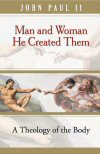
Man and Woman He Created Them is John Paul II’s seminal work on the bodily dimension of human identity, sexuality, marriage, and celibacy. First written while he was Archbishop of Kraków, then later revised and delivered as a series of catecheses after he became pope, this work was called “theology of the body” by John Paul II himself. In his momentous teaching, John Paul II has left us the core of his great vision, focused on the mystery of love extending from the Trinity, through Christ’s spousal relation with the Church, to the concrete bodies of men and women. With keen insight into the modern “split” between the person and the body, he presents an integral image of the human person, one rooted in Sacred Scripture and the Church’s living tradition.
This translation of the pope’s work, prepared by biblical scholar Michael Waldstein, allows us to enter into John Paul II’s profound vision. With the inclusion of material previously unpublished in English, and the rediscovery of John Paul II’s own headings for the work, the reader is able to follow the pope’s thought with clarity and confidence.
Complete with a comprehensive introduction, translator’s footnotes, and detailed index, this edition has been crafted with the kind of insight that builds more than 20 years of scholarship on John Paul II’s great gift to the Church.
Michael Waldstein is going to put many people in his debt with this superb piece of work, a labor of love shaped by an acute intelligence. The illuminating translation, the brilliant introduction, and the carefully crafted index will make this the standard English-language edition throughout the twenty-first century for scholars, for pastors, for students, and indeed for anyone interested in exploring John Paul II’s most creative contribution to human self-understanding.
—George Weigel, senior fellow, Ethics and Public Policy Center
Now, for the first time in English, we have a professional, critical translation of these homilies. John Paul II’s “Theology of the Body” has been highly lauded as one of the greatest (if not the greatest) exposition on Christians sexual ethics, with a focus on the human person and the gift of the body. It is perhaps [John Paul II]’s greatest gift to the Church, especially as it was/is critical in the renewal of the Church after the devastating effects of the sexual revolution of the sixties and the irresponsible and childish rebellion of certain Catholic academics.
—Kevin Davis, ThM, University of Aberdeen
John Paul II (Karol Józef Wojtyla) (1920–2005) served as Pope for 26 years (1978–2005). In 1942, he felt called to the priesthood and began courses in the clandestine seminary of Krakow. Wojtyla was ordained to the priesthood on November 1, 1946, and shortly after, was sent to Rome where he worked under Garrigou-Lagrange. In 1958 he was appointed as the titular bishop of Ombi and auxiliary of Krakow and in 1964 was appointed as the archbishop or Krakow. Three years later, he was elevated to Cardinal.
In 1978, Karol Wojtyla was elected Pope, where he took on the name John Paul II. As Pope, he was instrumental in ending communism in his native Poland. He significantly improved the Catholic Church’s relationship with Judaism, Islam, the Eastern Orthodox Church, and the Anglican Communion. He has been acclaimed as one of the most influential leaders of the twentieth century.
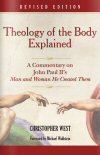
The first edition of Theology of the Body Explained quickly became a bestseller, serving as a standard reference text in universities, seminaries, and private study. This newly revised and expanded edition is based on Michael Waldstein’s much improved translation of John Paul II’s catechesis published by Pauline Books & Media under the title Man and Woman He Created Them: A Theology of the Body.
Key insights discovered through Dr. Waldstein’s access to the John Paul II archives have been incorporated.
The text has been substantially reorganized to reflect what we now know about the structure of John Paul II’s original manuscript.
The newly discovered headings of the Pope’s original text have been incorporated.
The illuminating insights of John Paul II’s six undelivered and previously untranslated addresses on the Song of Songs, Tobit, and Ephesians are unfolded here for the first time.
The first edition of this work was magnificent. This new edition is even more so. No one, in my opinion, has thought more deeply about John Paul II’s mind-opening theology of the body than has Christopher West. The result is a book that lives up to its title, for it surely does ‘explain’ the theology of the body accurately, clearly, and in such a way that any intelligent person can understand. Quite an accomplishment!
—William May, professor, John Paul II Institute for Studies on Marriage and Family
We owe a debt of gratitude to Christopher West. Since he first discovered the Theology of the Body in 1993, he has been a pioneer in the difficult task of seeking the right language with which to explain John Paul II’s difficult theological and philosophical teaching. This newly revised commentary is the fruit of West’s own ever-deepening understanding and integration of the material. West’s work offers readers an excellent entry and much solid assistance in decoding John Paul II’s difficult text. It will encourage them to read John Paul II himself with more open eyes and with clearer reflection.
—Michael Waldstein, founding president, International Theological Institute, Austria
In this book, West recounts how the Theology of the Body had helped him heal from a long period of being a lapsed, worldly Catholic, and this sense of wonder and freedom permeates the book. There is food for the mind and the heart, as I have grown to appreciate the dignity of marriage, celibacy, and the human person in a way I would never have expected just a few years ago. The very methodical organization and annotation of this volume might lead one to suspect that this book is dry, but it in fact reads wonderfully. In the space of a few weeks I read the entire book, in spite of a busy schedule as a medical student.
—Gerald Nora, PhD, Pitt-Carnegie Mellon University
Christopher West is recognized around the globe for his work teaching and promoting John Paul II’s theology of the body. He serves officially as a research fellow and faculty member of the Theology of the Body Institute near Philadelphia. West has also taught graduate and undergraduate courses on a number of other faculties, including St. John Vianney Seminary in Denver, the John Paul II Institute in Melbourne, Australia, and the Institute for Priestly Formation in Omaha.
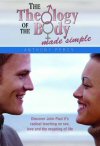
More than sexual, we are relational: meant for true and intimate relationship with each other and with God.
Rather than a casual indoor sport, sex is sacred. And John Paul II’s radical perspective on how we view life, love, and sexuality can transform our relationships into profound experiences of communion.
This is a simple introduction to the basic premise of the Theology of the Body. It explains how our bodies are symbolic, free, meant for love, and redeemed by Christ. It presents unambiguous reasons for the Church’s teaching on premarital sex, contraception, homosexuality, pornography, and more. And it gives reason to hope that the love we crave so deeply is, in fact, promised us by God-from the beginning.
Finally, a book that presents the thought of Pope John Paul II in a clear and concise manner! It makes his teachings on this often complex subject available to a popular audience.
—Marianne Luthin, director, Pro-Life Office, Archdiocese of Boston
Anthony Percy is a priest of the Archdiocese of Canberra & Goulburn, Australia. His doctorate in Sacred Theology is from the John Paul II Institute in Washington, D.C.
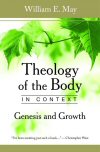
The zenith of John Paul II’s thought on the human person, marriage, and the family is found in his “theology of the body.” For the first time, William E. May provides a comprehensive yet readable overview of this work in the context of several other key writings of Karol Wojtyla/John Paul II, providing rich insights into its development.
Works surveyed include Love and Responsibility, Familiaris consortio, Mulieris dignitatem, and Letter to Families.
William E. May is one of my heroes. I am a former student of his, and his clear thinking and wit has left an indelible mark on my life. Reading Theology of the Body in Context was like being back in his classroom—an illuminating, thought-provoking joy. I’ve been awaiting just such a book, and May is the perfect one to have written it.
—Christopher West, Theology of the Body Institute
What a rich, illuminating resource! William May has presented John Paul II’s revolutionary defense of love penned at a time when societies often undercut love. Brimming with insight, this book is an invaluable companion for anyone seeking today to ‘discover the beauty and grandeur of the vocation to love.’
—Carl A. Anderson, Supreme Knight, Knights of Columbus
William E. May is emeritus Michael J. McGivney Professor of Moral Theology at the Pontifical John Paul II Institute for Studies on Marriage and the Family. He taught there from 1991-2008, after teaching moral theology at The Catholic University of America from 1971-1990. He is the author of many books, among them Marriage: The Rock on Which the Family Is Built and Catholic Bioethics and the Gift of Human Life. He currently serves as Senior Fellow for the Culture of Life Foundation.
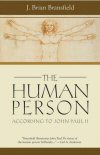
What does it mean to be human?
In his theology of the body, John Paul II made an important contribution to answering this question. Here Brian Bransfield provides a systematic approach to his teaching, using it as a basis for an integrated moral theology/Christian anthropology that gives practical support in living the Christian life.
Bransfield’s book is ‘required reading’ for those interested in the writings of Pope John Paul II on the theology of the body. The author gives valuable insights which will help the reader grow in a personal relationship with God and come to a deeper understanding of self. It is solid theology rooted in spirituality.
—Gregory M. Aymond, Archbishop of New Orleans
Bransfield motivates me as a reader. Bransfield’s obviously a natural teacher, because he taps into so many different stories and experiences throughout this book, and he also uses other people’s wisdom. He references the entire body of John Paul II’s work as well as many of the others who have written about it. This book becomes, then, a sort of ‘best of,’ written by someone who has a gift for sharing it and making you want to hunt down the source material for more. I found myself wanting to ditch my reading pile and just pick up Theology of the Body (both the shiny new one and the old, dog-eared copy) for myself. He made me want to revisit Love and Responsibility and a couple of the encyclicals I’ve been meaning to reread. He made me want to keep learning, keep digging, keep immersing myself. He made me want to WAKE UP, and maybe that’s the biggest nod I can give any author, especially one writing about such an important and life-changing topic.
—S. Reinhard, snoringscholar.com
What life-opening pages! Bransfield illuminates John Paul II’s vision of the human person brilliantly, fleshing out spiritual insights with an eye to the practical—a combination which opens for us the vocation to love, from the inside out.
—Carl A. Anderson, Supreme Knight, Knights of Columbus
J. Brian Bransfield is a priest of the Archdiocese of Philadelphia. He currently serves at the United States Conference of Catholic Bishops as Assistant General Secretary and Executive Director of the Secretariat of Evangelization and Catechesis. Bransfield received his doctorate in moral theology from the Pontifical John Paul II Institute for Studies on Marriage and Family. Prior to his current appointment, he served as professor of Moral Theology at St. Charles Borromeo Seminary. He is a noted national speaker and retreat director.
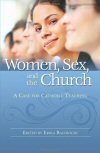
The contributors to Women, Sex, and the Church challenge the common misconception that Catholic teachings are anti-women and anti-sex. Instead, these women explore precisely how controversial teachings on abortion, sex, marriage, contraception, and reproductive technologies evidence the Church’s love of women. The timely issues of the priesthood, balancing work and family, and the intersection of Catholic sexual and social ethics are also discussed. The contributors to this text rely on biological, sociological, and medical evidence, combined with personal anecdotes and experience, to defend difficult Church teaching—all from a pro-woman perspective.
This book takes on both the thorniest dilemmas and the best kept secrets of the Catholic Church’s teachings concerning women, with thoroughness, intelligence, and honesty.
—Helen Alvaré, JD, associate professor of law, George Mason University
It should be required reading for every son, brother, fiancée, husband, father, seminarian, and priest. These women know something about life, and in listening to them you come away wanting to become a better man.
—Paul McNellis, SJ, Boston College
As a highly readable, provocative exposition of the case for the Church’s vision of sex, marriage, and sexual difference, it could not be more timely.
—Mary Shivanandan, PhD, professor of theology, John Paul II Institute for Studies on Marriage and Family
Erika Bachiochi holds a JD from Boston University School of Law and an MA in theology from Boston College, where she was a Bradley Fellow at the Institute for the Study of Religion and Politics. Bachiochi was the editor of The Cost of “Choice:” Women Evaluate the Impact of Abortion. She lectures at colleges, universities, and law schools on feminism, the family, abortion, and the church, and keynotes various conferences and retreats for Catholic women.
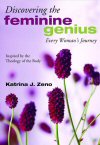
Explore the unique, creative abilities of women, and their distinctive call to make a gift of self. Drawing from John Paul II’s theology of the body, and her own life experiences, Katrina Zeno shares her insights into the human and spiritual journey of women.
Discovering the Feminine Genius presents a framework in which women can discover and understand their human and spiritual journey as a daughter of God, a woman, a unique individual, and spouse of the Spirit. Katrina Zeno, renowned speaker on the theology of the body, explores the role of women in our complex world and explains the concept of the feminine genius.
When people are seeking that one book that most simply and practically applies the principles of the theology of the body to the world of male-female relationships, I point them to Discovering the Feminine Genius.
—Thomas J. Loya, STB, MA, host of radio programs, “A Body of Truth” and “Light of the East Radio”
From the moment I met Katrina Zeno, I knew she would bring her own feminine genius to bear in promoting John Paul II’s theology of the body—Oh, how much the Church needs her gifts! . . . [This] is not only a must-read for women. Men, too, will benefit from her beautiful illumination of the feminine mystery.
—Christopher West, Theology of the Body Institute
Katrina J. Zeno is co-founder of Women of the Third Millennium (www.wttm.org) and the founding coordinator of the John Paul II Resource Center for the Diocese of Phoenix, Arizona. A popular retreat speaker, she is the author of The Body Reveals God: A Guided Study of Pope John Paul II’s Theology of the Body and When Life Doesn’t Go Your Way.
Reviews
7 ratings

David Leslie Bond
11/20/2013
Bobby Terhune
10/13/2013
Francis Rozario
9/19/2013

David Nielsen
9/3/2013

Charles R Selker II
8/28/2013
Michael Maria Waldstein
8/25/2013